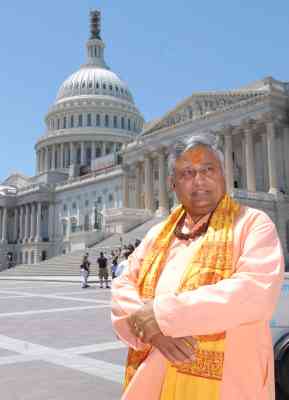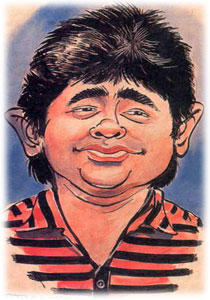Source: The Hindu

Struggle for space: Stills from Shyam Benegal’s “Ankur.
Popular director Anil Sharma, whose high-profile “Apne” was released recently to a fine reception, is a touch disappointed these days. His first, and arguably the finest film, “Shradhanjali” has found no takers. Much like Prak ash Jha’s “Damul” and “Hip Hip Hurray”.
Sharma laments, “TV satellite channels do not show ‘Shradhanjali’. They show what sells. They are ready to screen ‘Gadar’ and ‘The Hero’ 100 times but not my first film, which is also my best.” “Apne” was in great demand from channels even before the release.
No takers
Jha, who has also made a neat switchover to popular cinema with films like “Gangajal” and “Apaharan”, says, “There are no takers for serious cinema on television. The market is determining the choice. Nobody is interested in ‘Hip Hip…’ anymore. They want ‘Gangajal’. I am designing films that sell in the market. If I don’t texture a film according to the market, it won’t sell.”
He should know. While his films like “Damul” and “Hip Hip…” have struggled to find takers among the private channels, “Gangajal” and “Apaharan” have raked in more on the small screen than all his previous films combined.
It is not a surprise. Nor are Jha and Sharma without company. Govind Nihalani’s timeless classic “Ardh Satya” lies unsold as does his sci-fi venture “Deham”. Nihalani, whose “Takshak” and “Dev” (starring popular actors like Ajay Devgan and Amitabh Bachchan) have been shown repeatedly on TV, explains, “When films like ‘Ardh Satya’ were made, this kind of cinema had to fight for time then too.”
Yes, the small screen continues to ignore the works of the finest craftsmen of parallel cinema. Never far from being models of anonymity, serious filmmakers have failed to make the cut with TRP-driven satellite channels. Ironically, the stakes have seldom been higher for major players in the Hindi film world and the losses steeper for lovers of serious cinema.
At a time when major box office hits like “Rang De Basanti”, “Lage Raho Munna Bhai”, “Krrish”, “Dhoom-2”, “Phir Hera Pheri”, “Umrao Jaan” and “Don” have been lapped up for television screenings at whopping sums going up to Rs.15 crore, no channel is ready to push the envelope for serious cinema. Result? Parallel cinema is dying a second death.
Having lost out in the box office popularity stakes, worthies like Shyam Benegal, Mrinal Sen, Goutam Ghose, Kalpana Lajmi and others are being given the cold shoulder by satellite channels too. Almost all the movie channels including Set Max, Zee Cinema, B4U and Filmy show four films a day, but on a “safe average only about six parallel cinema films” a month.
At times less, coming down to as little as two out of 120 films a month. Interestingly, unreleased entertainers like “Partner” and “No Smoking” with popular stars have already been bought by various channels!
As Filmy’s Ashutosh says, “We don’t have the luxury of waiting to know the film’s box office fate.” The channels are ready to shell out up to Rs.30 crore for a Yash Raj bouquet, but will not stake even a fraction of that for parallel cinema. Even box office duds like “Raja ki Aayegi Barat” (one of Rani Mukherji’s early films) or “Janani” (a Bhagyashri-starrer that was taken off some theatres on the third day of its release) are preferred to classics like “Ankur”, “Bhumika”, “Mrigaya”, “Manthan”, “Saaransh”, “Katha”, “Ek Pal” or “Nishant”.
No wonder Kalpana Lajmi, who has directed films like “Ek Pal” and “Darmiyaan”, rues, “The channels only want films of the last five years. I am known to the new generation by some of my weaker films. Even I cannot see my favourite films like ‘Ek Pal’ on television anymore. The classics are lost.”
Only economics
Mahesh Bhatt, who started his career with films like “Arth” and “Saaransh” before being associated with the likes of “Murder” and “Zeher”, says “Contrary to the assumption that people want good cinema, they don’t. Even if they get it for free, they don’t watch it. Even Doordarshan, where profit is not the main motive, does not want art house cinema. It is a battle for the eyeballs, a battle for bums on the seat. It is pure and simple economics, no art.”
He reveals that the contract of his National Award winning “Zakhm” was not revived with Zee because it had exhausted its possibilities. “Zee found it too gloomy. The film in the first run on TV had exhausted its potential audience. Channels are petrified of losing their audience. When TV runs short of icons, it manufactures them.”
Not excluding himself, Bhatt says “You have to put up with potboilers on television today because even the filmmaker who made ‘Saaransh’ yesterday makes ‘Murder’ and ‘Jism’ today.” Incidentally, “Jism” got Star very good ratings!
What is worse, the channels plan special festivals of the films of Amitabh Bachchan —Zee cinema had Bachchan’s ‘Navarasa’ in April-May this year and around the same time Set Max had ‘Ab Tak Bachchan’ — Madhuri Dixit, Sridevi, Madhuri Dixit, Govinda and Akshay Kumar... But never is a festival of Shyam Benegal films or Goutam Ghose films planned or shown. And, in a rare case, as in Set Max showing films of Guru Dutt and Benegal, the films are dumped in the early morning slot, sometimes starting as early as 8.00 a.m. on weekdays. And they are completely off the radar on weekend mornings “as that is a time for family viewing”.

Dhoom 2”.
Nihalani states the obvious, “TV is a very commercial medium. The best time goes to blockbusters. The ‘other’ kind of films are shown according to the channel’s convenience. Often more like a filler.”
Ashutosh admits, “There are not too many art movies on the channel. They don’t work well if you take ratings into account. Ninety per cent of people don’t want them. One has to make the channel work. We are not for classics that don’t sell. It is a battle for the eyeballs. Even popular films like ‘Pakeezah’, ‘Guide’ don’t work.”
Older and cheaper
Set Max’s Sneha Rajani takes the same line. “When one criticises the channels for not showing serious films one must remember their number is smaller too. We have Ghose’s ‘Yatra’ and some of Benegal’s movies like ‘Sardari Begum’ and ‘Kalyug’. We do not have a strict schedule for them but Sunday morning is ruled out for any library movie.”
A library (old film of about 25-30 years) movie is purchased by a channel at less than one/tenth the cost of a blockbuster. The older it gets, the cheaper a movie becomes for channels. Still the best works of Guru Dutt and Bimal Roy hardly make it to the schedules of movie channels. For evidence, just surf the timetables of Set Max, Zee Cinema, B4U, Filmy and others. No movie has made it for screening in May. Even Star Gold that started with the idea of showing yesteryear super hits now plays regular, usually relatively new, movies.
Rajani counters, “When they talk of serious cinema, why only the past? We have shown Aparna Sen’s ‘15 Park Avenue’. I wish the audiences had supported us then.”
Zee Cinema’s Mohan Gopinath, head, marketing and programming, explains, “Case to case, we give recommendations according to the star cast, content, mass appeal, before a movie is selected. For instance we have had hits like ‘Diler’ and ‘Durga’. These films had flopped when they released in cinema halls. Sometime back we did show ‘Ijaazat’. But we normally have late night slot for such films as we have to cater to the larger audience at other times.” As Bhatt puts it, “Everybody talks of good cinema, nobody watches good cinema.”
Meanwhile, the rarely seen Lok Sabha TV is the only exception. Every Saturday evening, the channel is busy showing films like “Ek Doctor ki Maut” and “Pestonjee” at prime time. The films, according to the Executive Producer Vartika Nanda, “get good response from the viewers with a lot of enquiries about the films”.
Each film is introduced by an expert from the field and is ushered with promos played a couple of days before the film’s screening. “We are a low-profile channel. We don’t indulge in mirch masala. We are not in the rat race. We shows films with sub-titling and intend to continue the series over 54 weeks,” adds Nanda.
But is that enough to take on the juggernaut where each offering of Yash Raj Films or Vishesh Films comes with truckloads of advance publicity and a screening schedule more than a month in advance. No guesses needed!

 History was created in the United States Senate at 9.30 am on Thursday, when Rajan Zed, the Hindu chaplain of the Indian Association of Northern Nevada, opened the Senate with a Hindu prayer.
History was created in the United States Senate at 9.30 am on Thursday, when Rajan Zed, the Hindu chaplain of the Indian Association of Northern Nevada, opened the Senate with a Hindu prayer.


